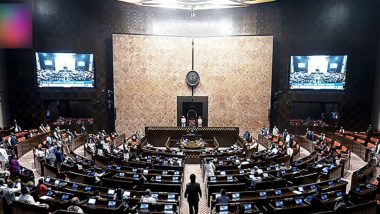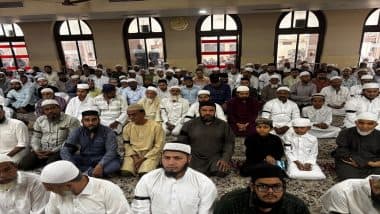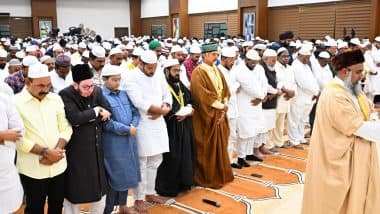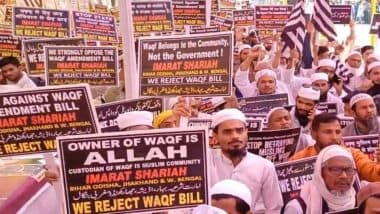New Delhi, September 19: The meeting of the Joint Parliamentary Committee on the Waqf (Amendment) Bill 2024 was held at the Parliament Library Building in the capital on Thursday. In the meeting, the committee listened to the views or suggestions of some experts and stakeholders, including Prof Faizan Mustafa, Vice Chancellor, Chanakya National Law University, Patna; Pasmanda Muslim Mahaaz; and All Indian Muslim Personal Law Board, on the Waqf Amendment Bill.
Notably, the Joint Parliamentary Committee will also conduct a meeting on September 20 where it will hear the suggestions of All India Sajjadanashin Council, Ajmer, Muslim Rashtriya Manch, Delhi and Bharat First, Delhi, on the Waqf (Amendment) Bill, 2024. Earlier, the meeting scheduled for September 18 was postponed after some members requested the same. Joint Parliamentary Committee Meets on Waqf (Amendment) Bill , Hears Experts and Stakeholders.
The fourth meeting of the Joint Parliamentary Committee (JPC) to examine the Waqf Amendment Bill, 2024, was held on September 6. During the meeting, senior officials of the Archaeological Survey of India (ASI) made a presentation before the Joint Parliamentary Committee. Several stakeholders, including the Zakat Foundation of India and the Telangana Waqf Board, put forth their views, suggestions, and oral evidence on the Waqf (Amendment) Bill, 2024.
Earlier, Union Home Minister Amit Shah said that the Waqf (Amendment) Bill, 2024, which addresses the management, preservation, and misuse of Waqf properties, will be passed in Parliament in the coming days. The government has stated that the amendments are necessary to streamline the functioning of Waqf properties and ensure better governance. Waqf Act Amendment Bill 2024 To Be Passed in Parliament Soon, Says Amit Shah While Addressing Press Conference on First 100 Days of 3rd Term of PM Narendra Modi Government.
The Bill, proposed several changes, including allowing a non-Muslim chief executive officer and at least two non-Muslim members to be appointed by the state government to the Waqf boards at the state level. It also proposed to make the District Collector the arbiter on whether a property is Waqf property or government land.
(This is an unedited and auto-generated story from Syndicated News feed, LatestLY Staff may not have modified or edited the content body)













 Quickly
Quickly





















